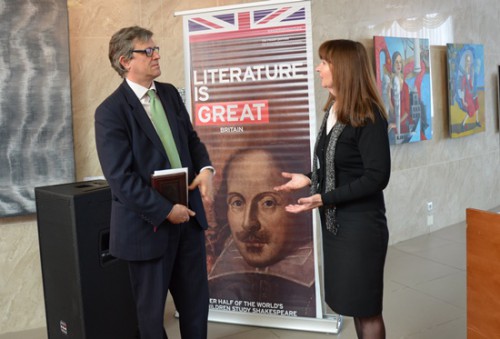23rd April 2014
Shakespeare in 600 words*
On occasion of the 450th birthday of William Shakespeare
He was born 450 years ago, possibly on the same day – the 23rd of April – that he died 52 years later. He was the son of a merchant from Stratford, in the Midlands of England. He probably attended the local school where he studied the Latin language and authors, and developed a talent for writing.
He married aged 18 – and six months later his first daughter was born. After some years, he appeared in London and joined the flourishing theatreland, where he became a leading figure as writer and actor. His plays were performed before Queen Elizabeth and her successor, King James, who was patron of his troupe.
He retired from the theatre and returned to Stratford three years before his death. Sales of his works were so successful, publishers tried to pass off others as his. Several different versions of his complete works were published after his death.
So why is this obscure man so important?
We are sure of few details about his life, but we have extensive texts that he wrote, though some wish to believe others penned them. Those texts are full of wisdom and humanity, about our existence and how we feel, and are still relevant today.
He was a poet whose sonnets about his love for a dark lady were popular amongst his contemporaries. He was a master wordsmith who enriched his native tongue, creating many new words and crafting beautiful phrases to express his thoughts. His aphorisms resonate: acting “more in sorrow than in anger”, “suspicion always haunts the guilty mind”, and making “a virtue of necessity”.
If his brevity was often the soul of wit, he sometimes overly compressed his sentences. We need notes to understand his meaning 400 years later. If his language was full of sound and fury, and actors strut and fret upon the stage reciting his verses, he wasn’t always full of rhyme and reason.
That’s because he expressed emotion, which often isn’t coherent. He probed the psychology of his great characters – the jealousy of Othello, the existential indecision of Hamlet, or the ambition of Macbeth. He understood their weaknesses in the face of fate, and the dilemmas of their lives.
And he told wonderful stories in the 37 plays attributed to him, about the madness of young love, the consequences of breaking a vow, or the manipulation by rhetoric, and many more. He explained the histories of English kings, their compromises and how the wheel of fortune treated them.
He made comedy of mistaken identity, the blindness of unsmooth love and the tricks people play on one another. He was often bawdy, and his word play could be crude.
His mixing of the comic with the tragic was not to everyone’s taste. His greatest critics – Voltaire (who began as an admirer), Tolstoy and Shaw – found moral and aesthetic failings in his work. They disliked the ambiguity and flaws of his characters. They may have been reacting to the “bardolatry” of English romantic writers especially, who felt dwarfed by his achievements, and foreign admirers like Goethe and Hugo.
He hadn’t always been revered – it took the scholarship of Samuel Johnson and others to explain his genius. They understood that he represented people as they are: human, not superhuman. He observed and described the reality of humanity, rather than the ideals of exemplary morals.
The uncertainty over his life and authorship may frustrate us today, but he would probably like it. He has had greatness thrust upon him, and we would be rightly cursed to move his bones. After all, for him, the play was always the thing.
* According to Microsoft word count.
Why 600 words? Because he supposedly invented 600 new words in his play “Hamlet”, and I was asked to speak for 7 minutes on Shakespeare at an event at the Belarus National Library on 16 April.

Dear Bruce ,
what an excellent but also exhausting article to read. Really new and therefore notable to me is the fact that several d i f f e r e n t versions of his complete writings /works /poems were published after his death. So it would be interesting for mr to know in how m a n y different languages they were once translated. Last but not least : I only can agree to yr. statement that his texts /lyrics/poems were and are so full of wisdom and humanity . Plus and most remarkable to me : they were and are still important , necessary and r e l e v a n t for us today.
(“…so much has already been said about Shakespeare that there doesn `t seem to be anything more to say , yet it ´s the quality of the spirit that will forever stimulate my spirit / Felly, mae llawer eisoes wedi cael ei ddweud am Shakespeare thathere oes dim ar ôlisay. It yn ei ansawadd ei ysbryd hatwill am byth ysgogi fy ysbryd….”, German poet Goethe, “Shakespeare an No End” , 1813).
Best wishes & take care of yourself , liebe Grüßle & oin schöner Medwoch – Nachmittag, Ingo-Steven, Stuttgart